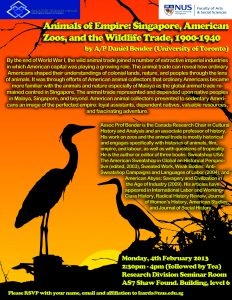Animals of Empire: Singapore, American Zoos, and the Wildlife Trade, 1900-1940
January 21, 2013

You are invited to a seminar on Monday, February 4th by Associate Professor Daniel Bender on the connections between American zoos, Singapore animal traders, and American popular culture, entitled Animals of Empire: Singapore, American Zoos, and the Wildlife Trade, 1900-1940.
Abstract
By the end of World War I, the wild animal trade joined a number of extractive imperial industries in which American capital was playing a growing role. The animal trade deserves a broader historical analysis in itself and for what it can reveal about how ordinary Americans shaped their understandings of colonial lands, nature, and peoples through the lens of animals; related to European empires; and developed a global knowledge about nature and animals that commercially engaged with local botanical knowledge. American animal collectors moved with ease within and across established European empires. In fact, it was through their efforts that ordinary Americans became more familiar with the animals and nature especially of Malaya as the global animal trade remained firmly centred in Singapore. Animal traders extracted resources in fleeting but locally labor-intensive ways. Within the framework of existing empires, they developed economic networks and local power that accentuated, respected, and subordinated colonial systems. The animal trade represented and depended upon native peoples in Malaya, Singapore, and beyond as supposedly willing workers and carriers of local knowledge in the service of the animal capture. In their bluster and self-promotion, American animal collectors presented to sedentary Americans an image of the perfected empire: loyal assistants, dependent natives, valuable resources, and fascinating adventure.
About the Speaker
Associate Professor Daniel Bender, Canada Research Chair in Cultural History and Analysis at University of Toronto and Chair of its Department of Historical and Cultural Studies, will be giving a talk sponsored by Singapore Research Nexus at FASS on February 4th, Monday, on the connections between American zoos, Singapore animal traders, and American popular culture.
Assoc Prof Bender is the Canada Research Chair in Cultural History and Analysis and an associate professor of history. His work on zoos and the animal trade is mostly historical and engages specifically with histories of animals, film, empire, and labour, as well as with questions of tropicality. He is the author or editor of three books: Sweatshop USA: The American Sweatshop in Global an Historical Perspective (edited, 2003), Sweated Work, Weak Bodies: Anti-Sweatshop Campaigns and Languages of Labor (2004), and American Abyss: Savagery and Civilization in the Age of Industry (2009). His article have appeared in International Labor and Working-Class History, Radical History Review, Journal of Women’s History, American Studies, and Journal of Social History.
Assoc Prof Bender trained at New York University to be a social historian of American labour. In researching his dissertation on sweated labour in New York City, he was greatly influenced by the cultural, linguistic, and gender turns in American labour and working-class history. He examined the gendered and racialized discourses around sweatshops and how they came to be seen as the worst kind of workplaces. In his second book, Prof Bender examined more closely the place of industry in American culture. He placed debates about the origin of industry squarely at the centre of American’s enthusiasm for evolutionary theory. This book led him to think about the way Americans distinguished between imperial and metropolitan space, labour, and peoples and how they represented the tropics in popular culture. Deeply influenced by insights in food and animal studies, the new imperial history, and by the experience of teaching US history outside of the US, he has turned now to writing a popular book about zoos in American culture. He is also completing an edited book about labour and the US empire. He teaches classes in US empire, food, and animal studies. He can be reached at debender@utsc.utoronto.ca.
The talk will be chaired by Associate Professor Michelle Lazar (ELL) and take place from 2.30pm to 4pm, followed by Tea.
It will take place in the Research Division Seminar Room at AS7 Shaw Foundation Building, level 6, in room 06-42.
To get to the Research Division Seminar Room, walk straight past the restrooms after exiting the elevator, then past the glass door on the left, and one door on the right. The seminar room is in front of you at the end of the corridor.
If you would like to attend, please RSVP to fasrda at nus dot edu dot sg, with your name, email, and affiliation.
We are looking forward to seeing you there and anticipate a fruitful event.

